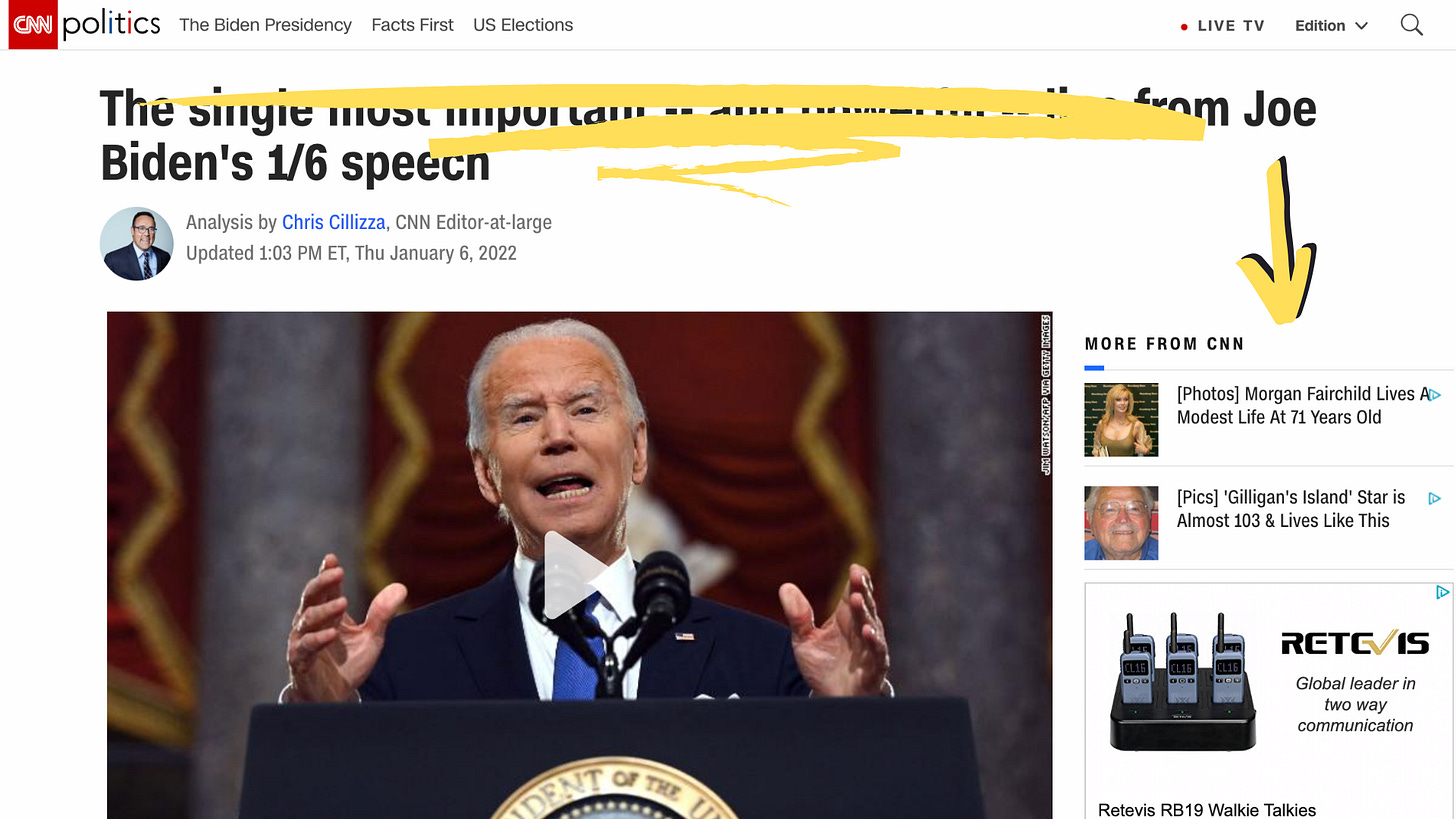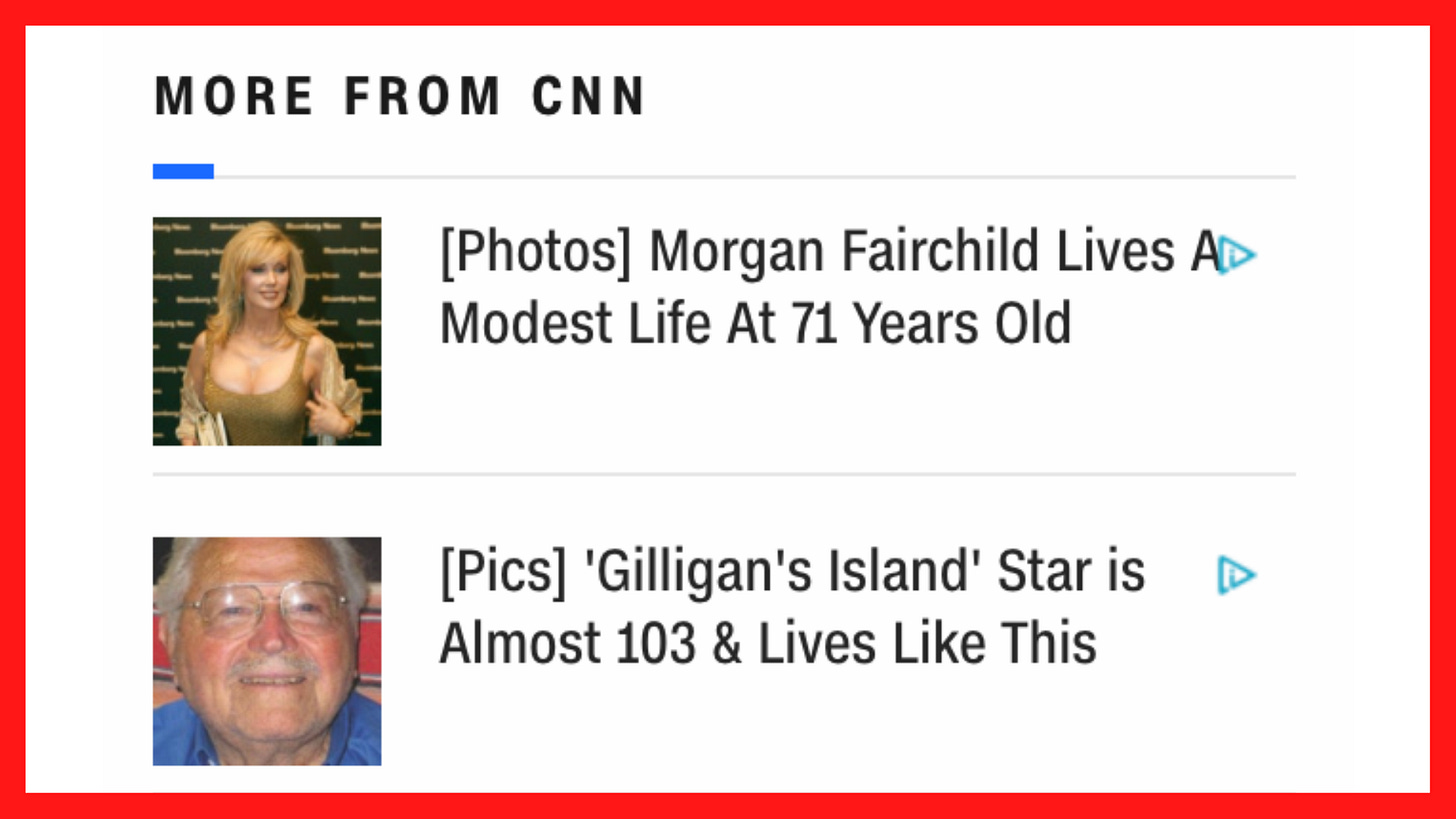Recently, I woke up bright and early to fire up Google News and scan the headlines. I do this every morning in search of stories ripe for parody. The easiest days are when AOC has done virtually anything. But on this day, the top story was the first anniversary of January 6th. Most outlets were calling the event “1/6,” in the hope of leaching a little gravitas from 9/11.
I skimmed some articles, including one from CNN. I was about to move on when something caught my eye. Right next to CNN’s headline, which read, “The single most important—and powerful—line from Joe Biden’s 1/6 speech,” I noticed another headline. (Pictured below.)
Here, you see a small banner that says, “More from CNN,” and then offers some clickbait. One is about Morgan Fairchild and the other promises “pics” of the 103-year-old star of Gilligan’s Island. Both links lead to a website called “cashroadster.com.” Cashroadster.com is a website that specializes in online horse shit. On this particular day, that meant a list of elderly celebrities including their age and net worth. I stared awhile until I snapped out of it and returned to CNN, only now, I didn’t care about the news, I cared about the ads—all six million of them—crammed into every nook and cranny. I’d never seen such a desperate plea for extra revenue. It was sad, actually. This classless collage of clickbait was likely the only thing keeping the lights on over at CNN headquarters. Plus, the more I scrolled—which I learned you can do indefinitely—the more the ads mixed with real headlines.
Soon, I saw a story about Marjorie Taylor Greene beside another explaining, “How to clean your gym clothes, according to experts.” Which one is real? And before you point to the CNN logo in the top left corner of the Greene story, notice the banner reading “CNN Underscored” in the bottom right of the gym clothes story. This begs the question, what the hell is CNN Underscored? Does anyone know? Does it matter?
Also, why are some of CNN’s ads targeted to my web browsing history—like the one for digital pianos—while others bear no correlation to anything I’ve ever looked at? For instance, the entire top third of CNN’s webpage was dominated by an ad for women’s sneakers made from recycled water bottles.
So, why mention all this?
Well, once upon a time in 1980, a young entrepreneur named Ted Turner co-founded CNN as America’s first 24-hour news network. He vowed the channel would never stop running until the last day on Earth. (Turner even commissioned a special “doomsday tape” to be aired in the event of the apocalypse.)
The young cable news network set out to build its reputation as “The Most Trusted Name in News.” And for a while, it succeeded. Yet as the eighties melted into the nineties and the forces of corporate consolidation reigned supreme, CNN found itself bouncing inside a torrid pinball machine of mergers and acquisitions until it finally wound up as a tiny and thoroughly inconsequential subsidiary of a subsidiary of a subsidiary of AT&T.
But let’s back up to untangle what happened. First, CNN is merely a division of the larger Turner Broadcasting System, which includes TBS (obviously), CNN, TNT, and TruTV. Turner Broadcasting System, abbreviated as “Turner,” was then acquired by Time Warner in 1996. Then—fifteen years after Time Warner’s disastrous flirtation with AOL—the company got acquired by AT&T for $85.4 billion. (And yes, the Justice Department filed an antitrust lawsuit to block the acquisition, but it was promptly squashed.)
Then, in 2019, AT&T reorganized WarnerMedia (the new name for Time Warner) in a way that dissolved Turner altogether. CNN became a minor subsidiary of a new organization called WarnerMedia News & Sports. After that, in 2021, AT&T announced plans to “spin off” WarnerMedia and merge it with Discovery Inc. Here’s how that deal will work:
AT&T sells 29% of its stake in WarnerMedia for a tidy $43 billion in cash and debt. It retains 71% ownership, thereby maintaining total control. WarnerMedia is then merged with Discovery Inc. to form a new, publicly traded company called WarnerMedia Discovery. This deal is expected to be finalized by mid-2022.
So, where is CNN in all of this? What happened to that shiny, first-of-its-kind company founded by a gutsy entrepreneur in 1980? Well, the short answer is that that company is gone. Its name still exists, but nothing more. What was once a proud and independent news organization is now a hollowed out, used up, has been, out of touch, totally irrelevant shell whose pitiful attempts to navigate the modern, digital landscape are little more than a minor irritant to some faceless, C-suite executive at AT&T who would prefer to see a slightly higher number at the end of each quarterly earnings report. In other words, CNN ain’t shit.
But before you celebrate that (if you’re a Fox News fan, that is), remember that CNN’s downfall is not a unique story. Countless other companies with trusted brand names have been sucked down the same whirlpool. The end result of corporate consolidation is always the same: the rapid degradation of the smaller company’s product. You see it everywhere, from Twinkies to TVs. The price is low, but so is the quality. This is one reason you hear people say, “they just don’t make ’em the way they used to.” And they’re right. They don’t make them the way they used to. They outsource the manufacturing, they use cheaper (often toxic) ingredients, and cut every corner they can find.
This trend affects everything. Have you been to a doctor lately? It’s horrific. Gone are the days when MDs owned their own practices and made their own decisions. Now, most of them are low-level employees for giant healthcare conglomerates. And while some doctors might still make an effort to “care about” or “get to know” their patients, most do not. They don’t have the time. Their offices have been transformed into medical “Jiffy Lubes,” where the goal is to crank as many patients through the machine as possible. More Patients = More Money.
The unspoken corporate ethos of “profits over people” is never on more display than when a once noble company is acquired by a larger one. CNN is a good example. The company didn’t start out as the shameless husk that it has become. It started out as a goddamn news organization. To people like me, that really means something. It had real reporters with real ethics and real integrity. Now it has Brian Stelter.
This is what happens when any organization gets too big. It doesn’t matter if it’s a company or a government. The size of it impersonalizes it. It can’t afford to deal with people as individuals, only as statistical groups. When CNN’s president Jeff Zucker makes a decision, he is not making it solely for the benefit of CNN. He is making that decision as an employee of WarnerMedia, which in turn is beholden to AT&T.
CNN, as a tiny subsidiary, cannot do anything that might jeopardize the business dealings or the stock value of its parent. Zucker knows this. He also knows he can be fired at any time. He’s not a “president,” he’s a middle manager. His task is to toe the line and prevent anyone from rocking the boat—a job description anathema to the very concept of journalism.
And is CNN the only channel owned by a corporate behemoth? Of course not. Who owns MSNBC? Comcast. Who owns the Washington Post? Jeff Bezos. Name any major news outlet, and somewhere lurking behind it is a giant vampire bat waiting to swoop in and suck it dry. In a world like that, how can anyone trust anything? The fact is, you can’t. So instead, you choose your own reality. Are you pissed off? Then Fox News is for you. Are you a sanctimonious prick? MSNBC’s got you covered.
But what about The New York Times, does anyone own that? Well, yes and no. The Times is a publicly traded company that’s governed by the Sulzberger family. (Kind of like how the Murdochs control Fox.) And while it isn’t beholden to any specific conglomerate, it is beholden to its rapidly dwindling customer base, which is mostly comprised of affluent, college-educated liberals. This means the paper has no choice but to color within a very narrow set of lines lest it face certain destruction. And you can bet your life that a company like Disney would love to scoop up The New York Times, which means it is only a matter of time until it does.
This is the future, and it’s coming whether we like it or not. Business will continue to consolidate. Wealth will continue to consolidate. Power will continue to consolidate. Goods and services will drop in quality, government will grow and become less responsive, and the standard of living will plummet. There is no stopping any of this. Democrats—whether wittingly or not—are pushing for it, and Republicans are too feckless and short-sighted to stand in its way. The GOP can win all the elections it likes, either in Congress or the White House, but it won’t matter. President Trump was a bull in a china shop, and even that gregarious bastard could barely move the needle. So no, politics will not save America. Nothing will. And do you know why? It’s actually quite simple.
In America today we have the Constitution and we have the Declaration of Independence. We have three branches of government and we have checks and balances. But none of that is worth a damn without a soul.
Ask yourself this question: Is “freedom” still the beating heart of this country?
I think we both know the answer. Once upon a time it was. Today it is not.
So, if our collective heart is not freedom, then what is it? If you live in a city, go outside and take a look. If you don’t, then fire up Google News and scan the headlines. What do you see?
Greed.
And until we fix that, we are all completely fucked.








It's always illuminating to have a look a the shareholdings of the corporates. And you'll find, that regarding every corporate on the planet, that they have shareholdings in common. Some minor differences but nothing that refutes the claim.
Communism and capitalism end up in the same place. Both are not systems that operate on the masses having a stake. And are therefore both susceptible to a system that does have that.